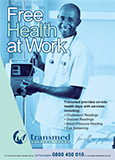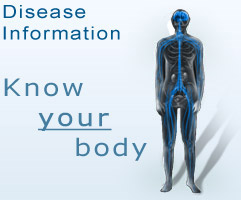Pneumonia
What is pneumonia?
Pneumonia is an infection of the lungs. It is a serious condition that can affect all age groups. However it is most serious in young children, persons over the age of 65, and those with underlying medical conditions such as congestive heart disease, diabetes and chronic lung disease. It is most common during the winter months and occurs more often in men than women.
Causes of pneumonia
Your body has natural defence mechanisms to protect your lungs from infection. You are exposed to bacteria and viruses that can cause pneumonia on a daily basis, but your body usually prevents most of these organisms from invading your airways. Once organisms slip through your defences and enter the lungs, they may inhabit the air sacks of the lung where they rapidly grow in number. This area of the lung then becomes filled with fluid and pus as the body attempts to fight off the infection.
Pneumonia is usually caused by infection and literally means inflammation of the lungs. It can be caused by bacterial, viral and fungal infection. Pneumonia could also be a secondary complication of a viral respiratory condition such as flu, especially in people with an immune deficiency.
Bacterial infection
Many types of bacteria can cause pneumonia. Bacterial pneumonia can occur on its own, at the same time as viral pneumonia, or you may develop it after you've had a viral upper respiratory infection such as flu. Bacterial pneumonia is often confined to just one area (lobe) of the lung. This is called lobar pneumonia. One or several lobes of the lung can be involved at the same time. The number of lobes involved, the type of bacterium and the ability of the patient to fight infection and take medication, usually determine the severity of the condition.
Viral infection
Viruses are the cause of pneumonia in 50% of cases. Viral pneumonia tends to begin with flu-like signs and symptoms. It usually starts with a dry (non-productive) cough, headache, fever, muscle pain and fatigue. When you have viral pneumonia, you run the risk of also developing a secondary bacterial pneumonia.
Symptoms of pneumonia
- Fever of 38.5ºC or above.
- Cough, which often produces sputum (mucus/phlegm) from the airways. The colour of the phlegm may be green or rusty, occasionally with blood specks. However, sometimes no sputum is produced.
- Night sweats.
- Shallow, rapid breathing.
- Chills or shaking.
- Chest pain, which is worsened on inhalation or coughing. This may be only on one side and feels deep in the chest. If the pneumonia is complicated, a painful rubbing sensation may be felt with each breath.
- Less movement on the affected side of the chest.
- Fast heart rate.
- Tiredness, body weakness.
- Change in mental status (especially in older people).
Bacterial pneumonia can start quickly over as little as just a few hours and make you very sick. Often respiratory tract infections precede the episode and the following signs develop:
- sore throat;
- runny or blocked nose;
- dry cough, which changes to a cough with sputum production; and
- fever.
Viral pneumonia can start at a slower pace and be less severe at first. Sometimes it may go unnoticed because the person may not feel very ill. These symptoms depend on the age of the patient and other underlying health problems.
In elderly people these symptoms may be much less noticeable. Shortness of breath is not easy to spot but may be visible when talking becomes interrupted and difficult. In young children these signs may also be unclear, although fever should always arouse suspicion.
Risk factors
Adults aged 65 or older and very young children, whose immune systems aren't fully developed, are at increased risk of pneumonia. You are also more likely to develop pneumonia if you are part of the following high-risk groups:
Children and teens
- All children between the ages of six and 23 months, as their immunity levels against infection are at its lowest and their exposure rate high if they attend a crèche.
- All children who have chronic heart or lung conditions, including asthma.
- All children who have chronic conditions, as well as those who have required hospitalisation or regular visits to the doctor during the preceding year.
- All children who live with someone in a high-risk group.
- All children and teenagers (from six months to 18 years) on long-term aspirin therapy, because of the dangers of Reye's syndrome (disease of the brain and liver) if they catch the flu and run a fever.
- School children are two to three times more likely than adults to get flu, and to rapidly spread the virus to others. Studies have shown that families with school children have more infections than other families.
Certain conditions
These include immune-deficiency conditions such as HIV/AIDS and chronic conditions such as cardiovascular disease, emphysema and diabetes. You are also at increased risk if you have had your spleen removed, or your immune system has been impaired by chemotherapy or long-term use of immunosuppressant drugs.
Smokers and alcohol abusers
Millions of microscopic hairs (cilia) cover the surface of the cells lining your bronchial tubes. The hairs beat in a wave-like fashion to clear your airways of normal secretions, but irritants such as tobacco smoke numb the cilia, causing secretions to build up. If these secretions contain bacteria, they can develop into pneumonia. Alcohol interferes with your normal gag reflex as well as with the action of the white blood cells that fight infection.
Hospitalisation in an intensive care unit
Pneumonia acquired in hospital tends to be more serious than other types. People who require mechanical ventilation are particularly at risk. The breathing tube (endotracheal tube) bypasses the normal defences of the respiratory tract, prevents coughing, may allow the stomach's contents to back up into the oesophagus where they can be aspirated, and may harbour bacteria and other harmful organisms.
Exposure to certain chemicals or pollutants
When to see your doctor
It is extremely important to treat pneumonia as soon as it starts, as this will prevent complications, especially in very young or older people.
Seek urgent medical attention in the following emergency situations:
- breathing difficulties develop that seem to exhaust the patient - laboured, rapid and shallow breathing with wheezing may indicate a severe episode; and
- chest pains develop that are crushing or burning, increase in intensity and are associated with sweating and nausea.
A doctor should be consulted soon if:
- coughing producing yellow or green sputum has been present for more than two days;
- coughing producing rust-coloured sputum occurs or blood is coughed up;
- cough persists for more than seven to 10 days;
- fever over 38.5°c develops;
- chills develop; and
- chest pains develop and are exacerbated by breathing or coughing.
Treatment of pneumonia
Antibiotics are used to treat bacterial pneumonia and, although antibiotics aren't effective against viral pneumonia, they may be given initially until the cause is confirmed.
If hospitalisation is necessary, oxygen may be needed to aid breathing and an intravenous drip may be used to provide fluids if the person is dehydrated.
Complications such as lung abscesses can follow pneumonia, so always seek further help if someone who appeared to be recovering, relapses.
Not all uncomplicated, single-lobe community-acquired pneumonia cases need to be admitted to hospital. In many cases especially in young, healthy patients, hospitalisation is not required and can be treated with a combination of antibiotics, rest, plenty of fluids and paracetamol, ibuprofen or aspirin (children under 16 should not be given aspirin).
Symptoms usually improve in two to three days. If the patient responds well, this treatment is continued for the full duration, which could be seven to 14 days. If the response to the prescribed medication is inadequate, sputum cultures should be obtained for further investigation.
Always take your medication as indicated by your doctor. To prevent the increasing rate of antibiotic resistance:
- discard any unused antibiotics and don't give it to others; and
- always take the whole course of the prescribed antibiotic. Continue even when the infection improves, unless directed otherwise by the doctor.
Prevention of pneumonia
Pneumonia is contagious so, if someone in your home has pneumonia, try to contain the condition by teaching him/her some healthy habits, such as:
- always holding your hand or a tissue in front of your mouth when you sneeze or cough;
- washing your hands regularly;
- not sharing glasses, cups, eating utensils or washcloths;
- ensuring that your home is properly ventilated;
- building your immune system by eating a healthy diet with lots of fresh fruit and vegetables;
- exercising regularly; and
- ensuring that you get enough vitamin C, E, B6, B12, zinc and calcium for increased immunity.
A vaccine exists that may protect against many types of pneumococcal bacteria that commonly cause pneumonia. It does not protect against pneumonia caused by other forms of bacteria, viruses or fungi. The vaccine is recommended for those who are older than 65 years or at higher risk due to underlying medical conditions such as:
- Hodgkin's disease and some other cancers;
- liver cirrhosis;
- heart failure;
- kidney failure;
- impaired immune system (HIV infection);
- chronic lung condition (such as asthma, chronic bronchitis, chronic obstructive pulmonary disease, emphysema, cystic fibrosis, bronchiectasis);
- sickle cell anaemia;
- alcoholism;
- organ transplant; and
- splenectomy (removal of spleen).
It is probably enough for healthy, older adults to be immunised once for lifetime protection, but blood tests to check antibody levels are advisable every five years. Patients with underlying medical conditions might benefit from vaccinations every five years. If allergic reactions occur, the immunisations should not be given.
Vaccinations for flu are given on a yearly basis, since new strains develop annually. These are of benefit to those who are at risk of developing pneumonia after bouts of flu. It may be given at the same time as the pneumococcal vaccine.
References:
UpToDate patient information
 TransmedBanner4.jpg)

